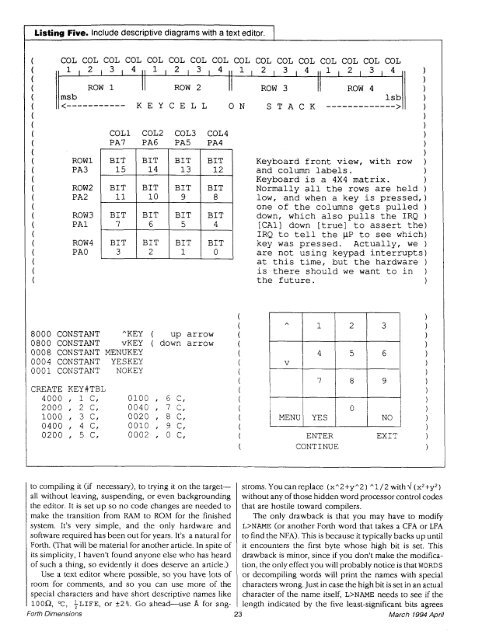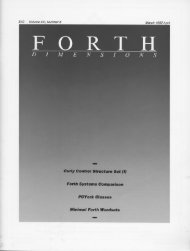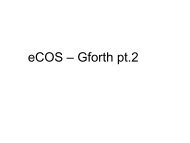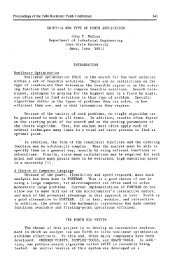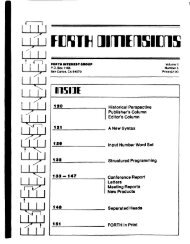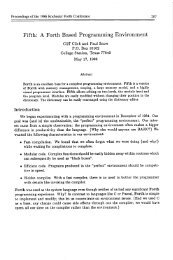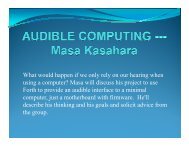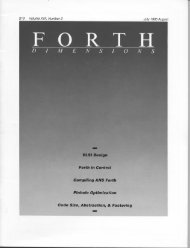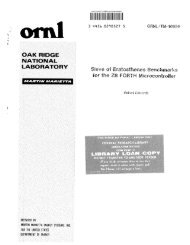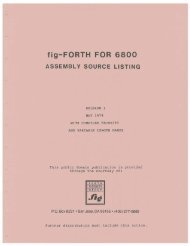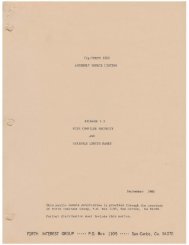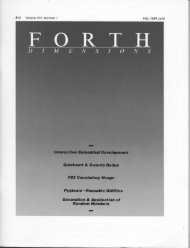FAST Forth Native-Language Embedded Computers
FAST Forth Native-Language Embedded Computers
FAST Forth Native-Language Embedded Computers
You also want an ePaper? Increase the reach of your titles
YUMPU automatically turns print PDFs into web optimized ePapers that Google loves.
'1<br />
Listing Five. Include descriptive diagrams with a text editor.<br />
(<br />
(<br />
(<br />
(<br />
(<br />
(<br />
(<br />
COL COL COL COL COL COL COL COL COL COL COL COL COL COL COL COL<br />
1 1 2 1 3 1 4 1 1 2 1 3 1 4 1 1 2 1 3 1 4 1 1 2 1 3 1 4<br />
ROW 1<br />
ROW 2<br />
ROW 3 ROW 4<br />
rnsb lsb<br />
<br />
1<br />
1<br />
)<br />
)<br />
1<br />
1<br />
(<br />
(<br />
(<br />
(<br />
(<br />
(<br />
(<br />
(<br />
(<br />
(<br />
(<br />
(<br />
(<br />
(<br />
(<br />
ROW1<br />
PA3<br />
ROW2<br />
PA2<br />
ROW3<br />
PA1<br />
ROW4<br />
PA0<br />
COLl<br />
PA7<br />
BIT<br />
15<br />
BIT<br />
11<br />
BIT<br />
7<br />
BIT<br />
3<br />
COL2<br />
PA6<br />
BIT<br />
14<br />
BIT<br />
10<br />
BIT<br />
6<br />
BIT<br />
2<br />
COL3<br />
PA5<br />
BIT<br />
13<br />
BIT<br />
9<br />
BIT<br />
5<br />
BIT<br />
1<br />
COL4<br />
PA4<br />
BIT<br />
12<br />
BIT<br />
8<br />
BIT<br />
4<br />
BIT<br />
0<br />
)<br />
1<br />
1<br />
1<br />
Keyboard front view, with row )<br />
and column labels. 1<br />
Keyboard is a 4x4 matrix. )<br />
Normally all the rows are held )<br />
low, and when a key is pressed,)<br />
one of the columns gets pulled )<br />
down, which also pulls the IRQ )<br />
[CAI] down [true] to assert the)<br />
IRQ to tell the pP to see which)<br />
key was pressed. Actually, we )<br />
are not using keypad interrupts)<br />
(<br />
(<br />
(<br />
at this time, but the hardware )<br />
is there should we want to in )<br />
the future. )<br />
8000 CONSTANT "KEY ( up arrow<br />
0800 CONSTANT vKEY ( down arrow<br />
0008 CONSTANT MENUKEY<br />
0004 CONSTAPJT YESKEY<br />
0001 CONSTANT NOKEY<br />
CREATE KEY#TBL<br />
4000 , 1 C, 0100 , 6 C,<br />
2009 , 2 C, 0040 , 7 C,<br />
1000 , 3 C, 0020 , 8 C,<br />
0400 , 4 C, 0010 , 9 C,<br />
0200 , 5 C, 0002 , 0 C,<br />
to compiling it (if necessary), to trying it on the target-<br />
all without leaving, suspending, or even backgrounding<br />
the editor. It is set up so no code changes are needed to<br />
make the transition from RAM to ROM for the finished<br />
system. It's very simple, and the only hardware and<br />
software required has been out for years. It's a natural for<br />
<strong>Forth</strong>. (That will be material for another article. In spite of<br />
its simplicity, I haven't found anyone else who has heard<br />
of such a thing, so evidently it does deserve an article.)<br />
Use a text editor where possible, so you have lots of<br />
room for comments, and so you can use more of the<br />
special characters and have short descriptive names like<br />
loon, OC, $LIFE, or +2%. GO ahead-use A for ang-<br />
(<br />
(<br />
(<br />
h<br />
1 2 3<br />
(<br />
(<br />
4 5 6<br />
( v<br />
(<br />
(<br />
(<br />
(<br />
7 8 9<br />
(<br />
0<br />
(<br />
(<br />
MENU YES<br />
NO<br />
( ENTER EXIT<br />
( CONTINUE<br />
stroms. You can replace (xA2+yA2 ) A 1 /2 with d (x2+y2)<br />
without any of those hidden word processor control codes<br />
that are hostile toward compilers.<br />
The only drawback is that you may have to modify<br />
L>NAME (or another <strong>Forth</strong> word that takes a CFA or LFA<br />
to find the NFA). This is because it typically backs up until<br />
it encounters the first byte whose high bit is set. This<br />
drawback is minor, since if you don't make the modification,<br />
the only effect you will probably notice is that WORDS<br />
or decompiling words will print the names with special<br />
characters wrong. Just in case the high bit is set in an actual<br />
character of the name itself, L>NAME needs to see if the<br />
length indicated by the five least-significant bits agrees<br />
<strong>Forth</strong> Dimensions 23 March 1994 April


